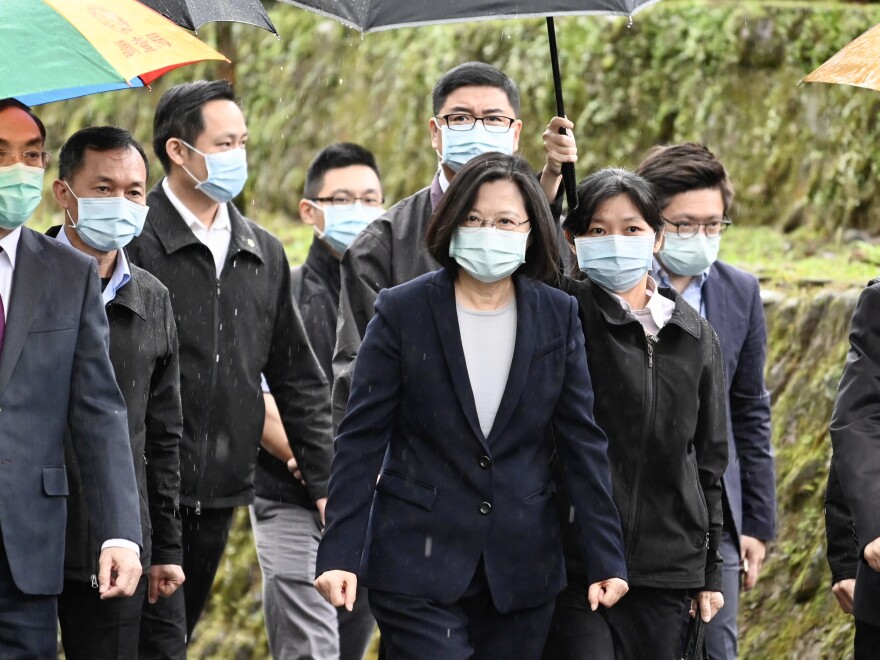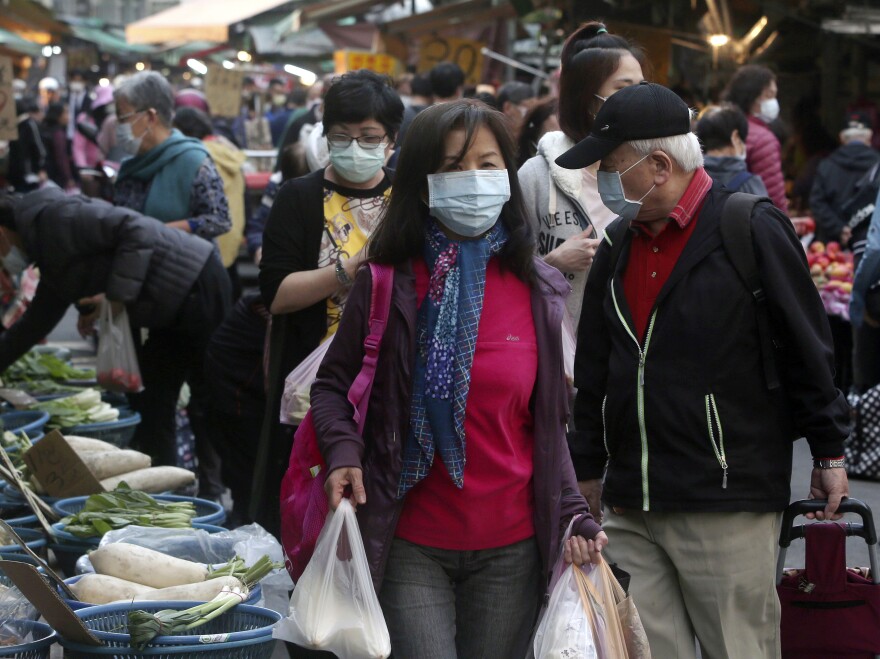Taiwan's handling of COVID-19 has won plaudits around the world, creating a historic public relations opportunity for the diplomatically isolated island.
Whether that leads to a higher profile on the international stage or a flare-up in tensions with Beijing — which regards Taiwan as Chinese territory — will depend on how the two sides play their cards at this pivotal moment, experts say.
Taiwan sees a chance to highlight its autonomy from China, and to push to increase its participation in international bodies it's been frozen out of, including the World Health Organization. That isn't going over well in Beijing, under pressure at home and abroad for its own handling of the virus.
Taiwan has so far confirmed 429 cases of COVID-19 and just six deaths -- despite its proximity and links to China, where the novel coronavirus outbreak first appeared. Its approach to mitigating the spread of the disease — including quick imposition of travel bans and quarantines — has been well documented.
Taiwan's relative success so far has put it in an unfamiliar position.
"Usually when Taiwan gets on international news, there is either a crisis in the Taiwan Straits or a natural disaster," says Alexander Huang, a political scientist at Taipei's Tamkang University. "This is a rare opportunity for Taiwan."
The government is seizing it, trumpeting its coronavirus experience and publicly offering international assistance. The Foreign Ministry even highlighted the fact that Taiwan's professional baseball season is under way at a time when virtually all other live sports are suspended worldwide.
The pandemic has also cast a spotlight Taiwan's diplomatic isolation. Only 15 countries recognize it, and Taiwan is barred from many international bodies, including the WHO, the global agency charged with leading the response to the COVID-19 pandemic.

But given Taiwan's success in handling the pandemic and the lessons it may offer the world, international pressure has mounted on the WHO to allow Taiwan to take part in its annual meeting, the World Health Assembly, next month. The United States, Japan and others have expressed their support publicly. In recent years, Taiwan hasn't even been allowed to attend the assembly as an observer.
China allowed the island to attend between 2009 and 2016, when Taiwan's president was Ma Ying-jeou, a leader deemed more China-friendly than current President Tsai Ing-wen. Beijing has since objected to Taiwan's participation, wary of Tsai, a member of the traditionally pro-independence Democratic Progressive Party.
China's ruling Communist Party has vowed to unite Taiwan politically with the mainland — by force, if necessary.
Analysts say Beijing is even less inclined than usual to give ground now to Tsai, who was re-elected in January amid an upsurge in anti-China sentiment, spurred by months of street protests in neighboring Hong Kong.
"I don't think the mainland is now in a mood to make concessions to her," says Wu Xinbo, dean of the Institute of International Studies at Fudan University in Shanghai.

Recent U.S. support for Taiwan is particularly irksome to Beijing, he says. In late March, President Trump signed a bill that supports Taiwan's international relations and its efforts to strengthen ties with other countries. On Monday, Taiwan's Minister of Health and Welfare Shih-Chung Chen held a video conference with Secretary of Health and Human Services Alex Azar to discuss COVID-19, among other issues.
"When Washington pushes this hard, it only makes things less likely to happen," says Wu, adding that Taiwan's "road to the international space comes through Beijing, not through Washington."
More broadly, the positive international attention that Taiwan has received comes at a time when Beijing is feeling particularly vulnerable.
"I would say the leadership is profoundly on edge," says Evan Medeiros, who served on the National Security Council during the Obama administration. "They're not out of the woods on COVID-19, they're facing historic lows in economic growth, and doubtless there continues to be criticism of how the Communist Party handled the outbreak."
Beijing's efforts to build goodwill abroad through donations of medical equipment — sometimes called "mask diplomacy" — have also backfired in some cases. There have also been reports of Chinese diplomats brazenly trying to compel aid recipients to praise China.

All of that may look like a win for Taiwan — but actually elevates the risks it faces.
"History tells you that some of the most precarious moments for international politics in East Asia are when the Chinese are on edge and they feel as if an external actor is using their domestic weakness as an opportunity to make gains," says Medeiros, now a professor of Asian studies at Georgetown University.
Taiwan's leadership needs to tread a fine line, while keeping the virus in check, to make the most of the opportunity, analysts say.
"The immediate goal is to emerge from this crisis as a country that is recognized as having been on the side of the angels," says Shelley Rigger, a Taiwan expert at Davidson College. "But at the same time, they don't want to do it in such a way that it generates more pressure on Taiwan from China."
It doesn't help that Taiwan's biggest benefactor and bulwark against China — the United States — is deeply mired in its own coronavirus crisis, and the rest of East Asia is also focused on the disease.
China has increased military maneuvers around the island during the pandemic, and may sense opportunity as the gaze of others is fixed on problems at home.
"Honestly, I'm as worried at this moment as I have ever been," says Rigger.
A crisis in the Taiwan Strait is a real possibility this year, warns Fudan University's Wu — especially if, in her second four-year term, which begins on May 20, Tsai adopts a stance that Beijing perceives as provocative.
"I think that that will force the mainland to respond in a substantive way," he says.
For now, though, Taiwan is riding high. There is rare bipartisan agreement on the island that it has handled the coronavirus well. And the experience has engendered something else as well: a sense of pride.
"To many people in Taiwan, that demonstrates to them that we as a nation, we are doing a good job," says Lai I-chung, a former foreign policy official for the DPP and director of foreign policy studies at the Taiwan Thinktank .
"So that has actually brought a renewed confidence among the citizens in Taiwan, that we don't have to have self-pity," he says. "We are as capable as anybody else."
Copyright 2020 NPR. To see more, visit https://www.npr.org. 9(MDAxMzY2MjQ0MDEyMzcyMDQ5MzBhZWU5NA001))




